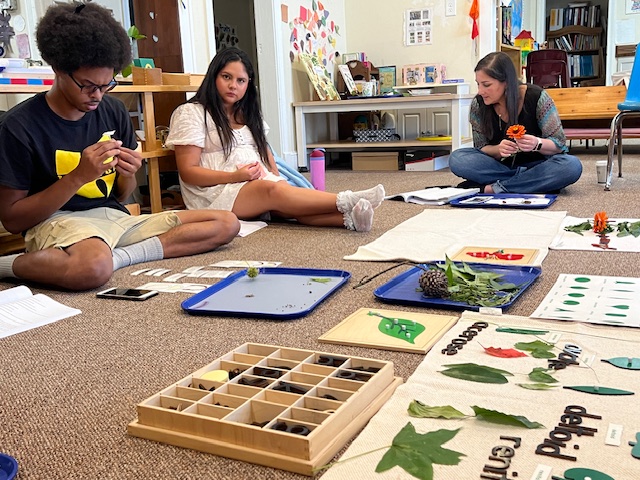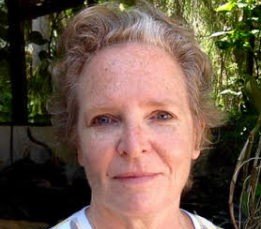PRED: Educator Practicum
This course consists of two components. The online class runs from Sept-Mar. The teaching internship is completed at your approved location from Sept-May. The course closes June 30th.
First Component - Online
The first component of the practicum course is online and includes:
- Video Lectures
- Ten Zoom chats with the course instructor
- Discussion forums on Montessori philosophy and practice
- Creation of an original year-long unit study involving lesson presentation and materials
- A case study of a student to practice developing interventions and indivualizing instruction
- Practicing classroom management strategies appropriate to Montessori environments
- Discussions about following the child, school leadership, and recordkeeping
- Reflections on teaching peace
- Observing other Montessori programs
- Advice on working successfully with colleagues
Second Component - Teaching (at your location)
The second component of the practicum course is a teaching internship that includes:
- A minimum of 400 teaching hours for Early Childhood
- A minimum of 400 teaching hours for Elementary I, Elementary II
- A minimum of 520 teaching hours for Elementary I-II
- Observations with the Practicum instructor, Supervising Educator, or Mentor if self-directed (Students who indicate they are self-directed during their practicum experience will need to make arrangements with the Practicum course instructor to travel to their school site once during the practicum experience. Montessori Live will charge an extra administrative fee of $250 for this visit. However, this fee does not include travel or per diem expenses to visit the school site. Students are responsible for these costs and must arrange travel to and from the location.
Prerequisites for Practicum Experience:
- Early Childhood program prerequisites require successful completion of FDN, OBS, and RESS-EC
- The Elementary I and EL I-II program prerequisites require successful completion of FDN, OBS, and RESS-EL, as well as three curriculum courses.
- Elementary II prerequisites are FDN, OBS, and RESS-EL and completing two curriculum courses.
- Approval of practicum site -The students are responsible for arranging employment and placement at a school for the practicum. Forms for approval of the practicum site are available in the Practicum Handbook and will be available upon notification of intent to enroll in the Educator Practicum course.
Once all prerequisites are completed, Montessori Live will grant the student educator’s Practicum permission to begin officially.
Practicum Site Requirements
The intern’s practicum site must ensure the following requirements:
- Age Range of Students: The practicum intern must make arrangements to work in a learning environment that predominantly contains children between the ages of 3 and 6 for Early Childhood and predominantly ages 6 and 9 for Elementary I. For Elementary I-II, a classroom of mainly 9-12 year-olds is optional. Elementary II requires a class of mostly children between the ages of 9-12.
- Environment: The intern’s learning environment must have a full essential complement of Montessori materials. The classroom environment should be consistent with the description in these guidelines for the age level served. Lists of required materials for each level can be found in the Montessori Research and Development albums (www.montessorird.com).
- Job Description/Contract: The school has given the intern a job description or contract.
- Supervision: The school agrees not to ask the intern to assume total responsibility for a class without the presence of a supervising teacher or another qualified staff person unless the intern is in a self-directed internship, in which case the training program or local mentor will assume more responsibility for oversight and communication.
- School Policies: The school has communicated administrative policies and guidelines for the internship to the intern.
- Non-Discriminatory Policy: The school has published non-discriminatory policies for both students and faculty/staff.
- Instructional/Observation Time Allowance: The school allows the intern release time to meet training observation requirements.
- Completion Support: The school will generally support the intern’s efforts to meet her/his practicum requirements.
- The School Administration agrees to cooperate and communicate with the training program as required.
Programs
Early Childhood (EC), Elementary I (EL I), Elementary I-II (EL I-II), Elementary II (EL II)
Required Documentation
Send all Documents to [email protected].
- We require photos of your learning environment embedded into a Word document to verify that you have the basic complement of Montessori materials in all areas.
- We required a video of your learning environment identifying the entire layout of the learning environment from every angle and narrating the video explaining your rationale for the room’s layout.
- Montessori Live requires the Practicum Site Agreement for Supervised Teachers to be completed and signed.
- Montessori Live requires the Practicum Site Agreement for Self-Directed Teachers to be completed and signed if the intern does not have a qualified Montessori educator on site.
- A copy of the Supervising Educator or Mentor’s Montessori credential.
Can I take the online component of the practicum while I’m also taking other curriculum courses?
It’s designed so that you can, but it’s a pretty tough schedule so you’ll want to make sure you plan accordingly. The online component consists of a online course that is geared towards practical application of Montessori philosophy with regularly scheduled chats and videos. Additionally, there are forums that need to be completed every other week. Finally, you’ll have three to four individualized live online video meetings through Zoom, Skype, or Facetime. These observations are scheduled well in advance between you and your instructor.
What is a Field Supervisor?
The Montessori Live faculty member in charge of the Practicum Course will act as your field supervisor in most cases. That is, this person’s role is to guide you through the practicum and provide individual virtual observations and support throughout the year.
What is a Supervising Educator?
The supervising educator is the person who works with you as a co-educator or mentor educator directly at your school site, ideally in the same learning environment. This person is certified and experienced in Montessori education at the level you seek to become certified.
SUPERVISING EDUCATOR CRITERIA
- Credentials: Supervisors must hold a MACTE-accredited teacher training program credential (or the equivalent) at the same level as the intern seeking and supply a copy to the training program’s registrar. The course instructor shall determine exceptions and report them to MACTE if applicable..
- Teaching Experience: The supervising educator must be in at least the third year of teaching in a Montessori setting.
- Student Experiences: The supervising educator is responsible for providing advice relating to the following areas:
- Preparation and maintenance of indoor environments
- Observation of lessons given throughout the internship
- Instructional strategies
- Assessment: The supervising educator must be able to meet with the intern regularly to provide advice and observe the intern’s environment to complete lesson observations. The supervising educator must complete a survey of the intern’s progress and be available to discuss progress with the Montessori Live practicum course instructor, if necessary.
What are the requirements for a self-directed internship?
Self-directed Interns must maintain regular contact with the training center throughout their internship year. The Practicum Instructor will act as the “Field Supervisor”. Self-directed interns participate in the online PRED course with all interns in their cohort. The online course component opens in September each year and closes June 30. Interns must complete all 12 required assignments. Self-directed interns must attend 100% of the live chats (or submit a discussion summary) and complete 100% of the forums throughout their internship year. In addition to the live chats and forums, the self-directed intern must stay actively in contact with the Practicum Instructor (aka Field Supervisor) through video conferencing, email, text, or phone. A fourth in-person observation of the intern will be required and can be completed either by the practicum instructor or an approved local mentor. Students who indicate they are self-directed during their practicum experience will need to make arrangements with either a local approved Mentor or the Practicum course instructor to travel to their school site once during the practicum experience.
Montessori Live On-Site Visit: Montessori Live will charge an extra administrative fee of $250 to travel to the student’s school site. The intern is responsible for paying for and arranging travel, lodging, car rental, and any per diem expenses such as tolls, parking, meals, or incidentals for the practicum instructor to visit the school site. Students are responsible for these costs and must arrange travel to and from the location.
Mentor Site Visit: Students who indicate they are self-directed during their practicum experience can arrange for a qualified and approved local Montessori educator to visit their school site at least once. The mentor is responsible for visiting the practicum site, completing a classroom management observation form (R7), and observing one lesson presentation using the Montessori Live form (R11). Any monetary fee arrangements are between the intern and mentor and are not the responsibility of Montessori Live.
MENTOR CRITERIA
- Credentials: The visiting mentor must hold a MACTE-accredited teacher training program credential (or the equivalent) at the same level as the intern seeking and supply a copy to the training program’s registrar.
- Responsibilities: The mentor is responsible for visiting the practicum site at least once, completing a classroom management observation form (R7), and observing one lesson presentation using the Montessori Live form (R11).
- The mentor may provide advice relating to the following areas:
- Preparation and maintenance of indoor environments
- Instructional and behavior strategies
- General advice regarding the Montessori classroom environment
Kym Elder
Instructor
Dr. Kym Elder is the founder and executive director of Montessori Live. Kym holds a doctorate in instructional technology and distance education and a master’s degree in charter school educational leadership from Nova Southeastern University.
Already a Student?
Montessori Live will enroll students in classes based on an agreed upon schedule. Contact [email protected] for changes to your schedule.
Already Enrolled?
Access MoodleRooms Classes
Ready to get started?
After you apply to become a student, you can begin taking courses.



